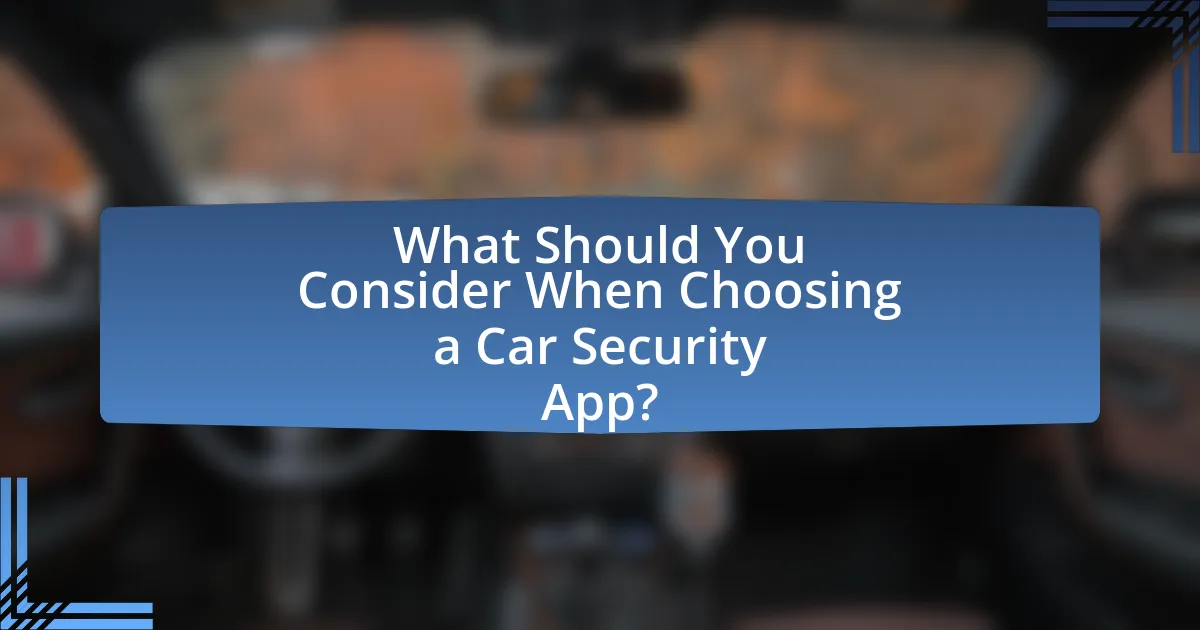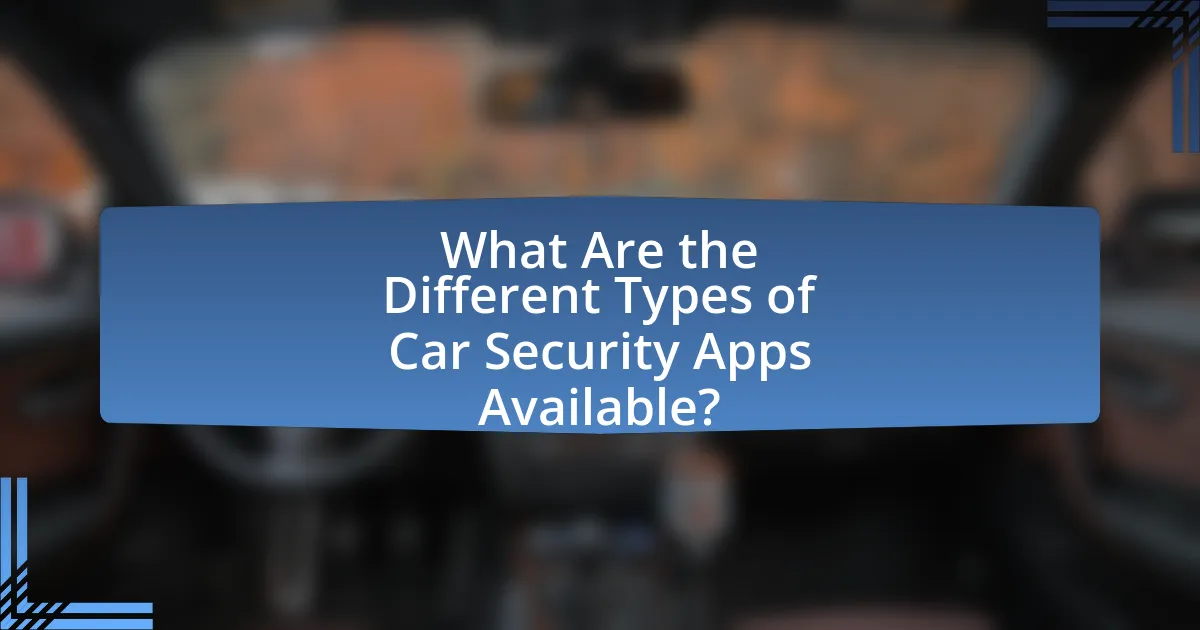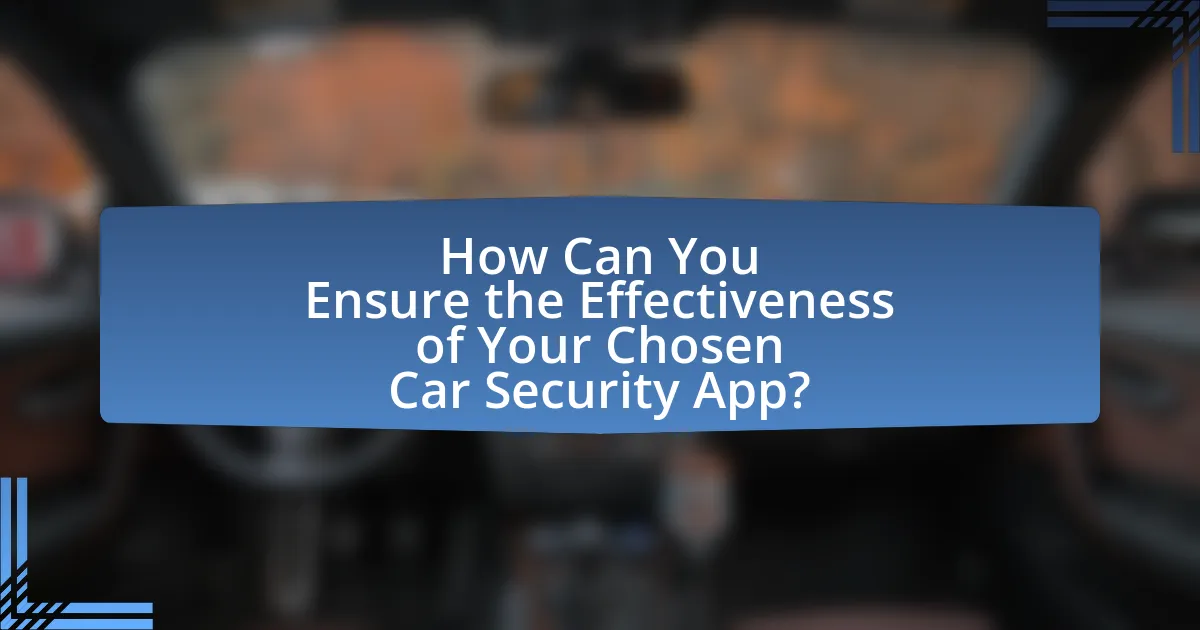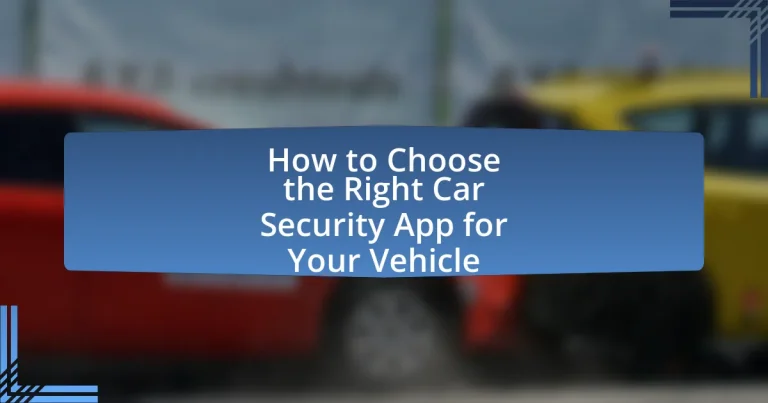The article focuses on selecting the appropriate car security app for vehicle protection. It outlines critical factors to consider, including app features, compatibility with vehicles, user reviews, and customer support. Key security features such as real-time tracking, alerts for unauthorized access, and user-friendly interfaces are discussed, along with the importance of GPS tracking and the role of customer support in enhancing usability. The article also compares different types of car security apps, highlights the significance of user feedback, and provides best practices for ensuring the effectiveness of the chosen app.

What Should You Consider When Choosing a Car Security App?
When choosing a car security app, consider the app’s features, compatibility with your vehicle, user reviews, and the level of customer support provided. Features such as real-time tracking, remote locking, and alerts for unauthorized access are essential for effective security. Compatibility ensures that the app can integrate with your vehicle’s systems, enhancing functionality. User reviews provide insights into the app’s reliability and performance, while strong customer support can assist with any issues that arise. According to a survey by Statista, 70% of users prioritize features and reliability when selecting security apps, highlighting the importance of these considerations.
How do you assess the security features of a car security app?
To assess the security features of a car security app, evaluate its encryption methods, user authentication processes, and real-time monitoring capabilities. Strong encryption protects data from unauthorized access, while robust user authentication, such as two-factor authentication, ensures that only authorized users can access the app. Real-time monitoring features, including alerts for suspicious activity, enhance the app’s effectiveness in preventing theft. According to a study by the National Institute of Standards and Technology, apps employing advanced encryption and authentication protocols significantly reduce the risk of data breaches, validating the importance of these features in car security applications.
What types of alerts and notifications should a good app provide?
A good car security app should provide real-time alerts for unauthorized access, vehicle movement, and location tracking. These notifications ensure that users are immediately informed of any suspicious activity, such as when the vehicle is tampered with or moved without permission. Additionally, alerts for low battery status of the app or device, maintenance reminders, and geofencing notifications enhance user awareness and vehicle security. Research indicates that apps with timely and relevant notifications significantly improve user engagement and response rates, making them essential for effective vehicle protection.
How does GPS tracking enhance the security of your vehicle?
GPS tracking enhances the security of your vehicle by providing real-time location data, which allows for immediate recovery in case of theft. When a vehicle is equipped with a GPS tracking system, the owner can monitor its location through a smartphone or computer, enabling swift action if the vehicle is stolen. According to a study by the National Insurance Crime Bureau, vehicles with GPS tracking systems are 50% more likely to be recovered compared to those without. This technology not only deters theft by making it easier to track stolen vehicles but also provides peace of mind to owners, knowing they can locate their vehicle at any time.
What user-friendly features are important in a car security app?
User-friendly features important in a car security app include real-time tracking, remote locking and unlocking, and instant alerts for suspicious activity. Real-time tracking allows users to monitor their vehicle’s location continuously, enhancing security and peace of mind. Remote locking and unlocking provide convenience and control, enabling users to secure their vehicle from a distance. Instant alerts notify users immediately of any unauthorized access or movement, allowing for quick responses to potential threats. These features collectively enhance user experience and effectiveness in protecting the vehicle.
How does the app’s interface affect user experience?
The app’s interface significantly impacts user experience by influencing usability, accessibility, and overall satisfaction. A well-designed interface enhances navigation, making it easier for users to access features and information quickly, which is crucial for car security apps where timely responses can be vital. Research indicates that 94% of first impressions relate to design, highlighting the importance of an intuitive layout and visually appealing elements in retaining user engagement. Furthermore, a study by the Nielsen Norman Group found that users are more likely to trust and continue using apps that provide a seamless and aesthetically pleasing interface, reinforcing the connection between interface quality and user retention.
What role does customer support play in app usability?
Customer support plays a critical role in app usability by providing users with assistance and guidance, which enhances their overall experience. Effective customer support helps users navigate the app’s features, troubleshoot issues, and resolve problems quickly, leading to increased satisfaction and retention. Research indicates that 70% of customers are willing to pay more for better customer service, highlighting its importance in usability. Additionally, apps with responsive customer support often receive higher ratings and positive reviews, further validating the connection between support and usability.
Why is compatibility with your vehicle essential?
Compatibility with your vehicle is essential because it ensures that the car security app functions correctly with the vehicle’s systems. When a security app is compatible, it can effectively communicate with the vehicle’s onboard diagnostics and security features, allowing for real-time monitoring and alerts. For instance, a study by the National Highway Traffic Safety Administration indicates that vehicle-specific apps can enhance security measures by up to 30%, as they are designed to integrate seamlessly with the vehicle’s architecture. This integration not only improves functionality but also enhances user experience and safety.
What types of vehicles are supported by most car security apps?
Most car security apps support a wide range of vehicles, including sedans, SUVs, trucks, and motorcycles. These applications are designed to be compatible with various makes and models, often utilizing OBD-II (On-Board Diagnostics) ports or GPS tracking systems to enhance security features. For instance, popular car security apps like Viper and CarLock provide services for both traditional combustion engine vehicles and electric vehicles, ensuring broad accessibility across the automotive market.
How can you verify compatibility before purchasing an app?
To verify compatibility before purchasing an app, check the app’s specifications against your device’s operating system and hardware requirements. Most app listings on platforms like the Apple App Store or Google Play Store provide detailed information about the minimum OS version, device models, and hardware specifications needed for optimal performance. Additionally, reading user reviews can reveal compatibility issues experienced by others, further confirming whether the app will function correctly on your device.

What Are the Different Types of Car Security Apps Available?
There are several types of car security apps available, including GPS tracking apps, immobilizer apps, alarm system apps, and remote start apps. GPS tracking apps allow users to monitor their vehicle’s location in real-time, enhancing recovery chances if stolen. Immobilizer apps enable users to disable their vehicle remotely, preventing unauthorized use. Alarm system apps provide alerts for suspicious activity, while remote start apps offer convenience by allowing users to start their vehicle from a distance. Each type serves a specific purpose in enhancing vehicle security and protecting against theft.
How do tracking apps differ from alarm apps?
Tracking apps primarily focus on monitoring the location and movement of a vehicle in real-time, while alarm apps are designed to alert users to unauthorized access or security breaches. Tracking apps utilize GPS technology to provide continuous updates on a vehicle’s whereabouts, enabling users to track their vehicle’s movements and retrieve it if stolen. In contrast, alarm apps typically activate a loud sound or notification when a vehicle’s security system is triggered, serving as a deterrent against theft or vandalism. The distinction lies in their core functionalities: tracking apps emphasize location tracking, whereas alarm apps prioritize security alerts.
What features are unique to tracking apps?
Tracking apps are unique due to their real-time location tracking capabilities, which utilize GPS technology to provide precise vehicle positioning. These apps often include features such as geofencing, which alerts users when a vehicle enters or exits predefined areas, and trip history, allowing users to review past routes taken. Additionally, many tracking apps offer remote immobilization, enabling users to disable their vehicle’s engine in case of theft. The integration of alerts for unauthorized movement and speed monitoring further enhances security, making tracking apps essential for vehicle protection.
What functionalities do alarm apps typically offer?
Alarm apps typically offer functionalities such as customizable alarm tones, snooze options, vibration alerts, and the ability to set multiple alarms. These features enhance user experience by allowing personalization and flexibility in managing wake-up times. Additionally, many alarm apps include features like gradual volume increase, integration with calendars for reminders, and smart home compatibility, which further improve their utility. The prevalence of these functionalities is supported by user reviews and app store ratings, indicating their importance in user satisfaction and effectiveness.
What are the advantages of using a comprehensive security app?
A comprehensive security app offers multiple advantages, including enhanced protection against theft, real-time monitoring, and integrated features for vehicle tracking. These apps utilize GPS technology to provide users with the ability to locate their vehicle instantly, which is crucial in the event of theft. Additionally, many comprehensive security apps include alerts for unauthorized access or suspicious activity, allowing for immediate action to be taken. Statistics indicate that vehicles equipped with advanced security systems are less likely to be stolen; for instance, the National Insurance Crime Bureau reported a 50% reduction in theft rates for vehicles with GPS tracking systems. Thus, the use of a comprehensive security app significantly increases the overall security of a vehicle.
How do all-in-one solutions compare to specialized apps?
All-in-one solutions offer a comprehensive range of features in a single application, while specialized apps focus on specific functionalities. All-in-one solutions can streamline user experience by consolidating multiple tools, which can enhance convenience and reduce the need for multiple subscriptions. For instance, a car security app that includes GPS tracking, alarm systems, and remote start features can provide a holistic approach to vehicle security. In contrast, specialized apps may excel in their particular area, such as advanced tracking or alarm systems, often providing deeper functionality and customization options. Research indicates that users may prefer all-in-one solutions for their simplicity, while specialized apps may be favored for their depth of features, depending on individual needs and preferences.
What additional features might a comprehensive app include?
A comprehensive car security app might include features such as real-time GPS tracking, remote engine immobilization, and alerts for unauthorized access. Real-time GPS tracking allows users to monitor their vehicle’s location continuously, enhancing recovery chances in case of theft. Remote engine immobilization enables users to disable the vehicle remotely, preventing unauthorized use. Alerts for unauthorized access notify users immediately if someone attempts to break into their vehicle, providing an added layer of security. These features collectively enhance the overall effectiveness of a car security app, ensuring better protection for the vehicle.
Why should you consider user reviews and ratings?
User reviews and ratings are essential because they provide real-world insights into the performance and reliability of car security apps. These evaluations reflect the experiences of actual users, helping potential customers gauge the effectiveness and usability of the app. Research indicates that 79% of consumers trust online reviews as much as personal recommendations, highlighting their influence on purchasing decisions. By considering user reviews and ratings, individuals can make informed choices, reducing the risk of selecting an ineffective or unreliable car security app.
How can user feedback influence your choice of app?
User feedback significantly influences the choice of a car security app by providing insights into the app’s effectiveness, usability, and reliability. Positive reviews often indicate that the app successfully meets user needs, while negative feedback can highlight potential issues such as bugs or inadequate features. For instance, a study by Apptentive found that 77% of users read reviews before downloading an app, demonstrating the importance of user experiences in decision-making. Additionally, user ratings can directly impact an app’s visibility in app stores, further influencing potential users’ choices.
What platforms provide reliable reviews for car security apps?
Platforms that provide reliable reviews for car security apps include Google Play Store, Apple App Store, and specialized tech review sites like CNET and TechRadar. These platforms aggregate user feedback and expert evaluations, ensuring a comprehensive overview of app performance and security features. For instance, the Google Play Store and Apple App Store allow users to rate and review apps based on their experiences, while CNET and TechRadar offer in-depth analyses and comparisons of various car security apps, highlighting their strengths and weaknesses.

How Can You Ensure the Effectiveness of Your Chosen Car Security App?
To ensure the effectiveness of your chosen car security app, regularly update the app and enable all security features. Regular updates are crucial as they often include security patches that protect against new threats; for instance, a study by the Cybersecurity & Infrastructure Security Agency found that 85% of successful cyberattacks exploit known vulnerabilities that could be mitigated by updates. Additionally, enabling features such as real-time tracking, alerts, and remote locking enhances the app’s protective capabilities, making it more difficult for thieves to bypass security measures.
What steps can you take to test the app’s functionality?
To test the app’s functionality, you should conduct a series of systematic steps including installation, user interface navigation, feature testing, and performance evaluation. First, install the app on a compatible device to ensure it functions correctly during the setup process. Next, navigate through the user interface to assess its intuitiveness and ease of use. Then, test each feature, such as alerts, tracking, and remote access, to confirm they operate as intended. Finally, evaluate the app’s performance under various conditions, including different network environments, to ensure reliability. These steps are essential for verifying that the app meets its intended functionality and user expectations.
How do you set up alerts and notifications effectively?
To set up alerts and notifications effectively, first, select a car security app that allows customization of alerts based on specific events, such as unauthorized access or movement. Next, configure the app settings to define the types of notifications you want to receive, ensuring they are relevant to your security needs. For instance, apps like Viper SmartStart or CarLock provide options to set alerts for various scenarios, enhancing user control. Additionally, ensure that notifications are sent through reliable channels, such as SMS or push notifications, to guarantee timely updates. Research indicates that personalized alerts increase user engagement and response rates, making it crucial to tailor notifications to individual preferences for optimal effectiveness.
What should you monitor to evaluate the app’s performance?
To evaluate the app’s performance, you should monitor key metrics such as response time, crash reports, user engagement, and battery usage. Response time indicates how quickly the app processes user requests, with optimal performance typically being under two seconds. Crash reports provide insights into stability issues, with a target crash rate of less than 1%. User engagement metrics, such as daily active users and session length, reflect how effectively the app retains users, while monitoring battery usage helps ensure the app does not excessively drain device power, ideally consuming less than 5% battery per hour of use. These metrics collectively provide a comprehensive view of the app’s performance and user satisfaction.
What best practices should you follow for optimal security?
To achieve optimal security for your vehicle, implement multi-factor authentication for your car security app. This practice significantly reduces the risk of unauthorized access, as it requires more than just a password to gain entry. According to a study by the Cybersecurity & Infrastructure Security Agency, multi-factor authentication can block up to 99.9% of automated attacks. Additionally, regularly update your app and vehicle firmware to patch vulnerabilities, as outdated software can be exploited by cybercriminals. Using strong, unique passwords for your accounts further enhances security, as weak passwords are easily compromised. Lastly, enable alerts for suspicious activities, allowing for immediate response to potential threats.
How often should you update the app for security improvements?
You should update the app for security improvements at least every month. Regular monthly updates help address newly discovered vulnerabilities and ensure that the app remains secure against evolving threats. According to the National Institute of Standards and Technology (NIST), timely updates are crucial for maintaining software security, as they often include patches for known security flaws. Additionally, many cybersecurity experts recommend monitoring for critical updates and applying them as soon as they are available, which can further enhance the app’s security posture.
What additional security measures can complement the app’s features?
Additional security measures that can complement the app’s features include the installation of a GPS tracking device, the use of a steering wheel lock, and the implementation of a car alarm system. GPS tracking devices provide real-time location data, enhancing recovery chances in case of theft. Steering wheel locks serve as a physical deterrent, making it more difficult for thieves to drive away with the vehicle. Car alarm systems alert the owner and bystanders to unauthorized access, further discouraging theft attempts. These measures collectively strengthen vehicle security by addressing both technological and physical vulnerabilities.
What common troubleshooting tips can help resolve issues?
Common troubleshooting tips to resolve issues with car security apps include restarting the app, ensuring the device’s operating system is up to date, checking internet connectivity, and verifying app permissions. Restarting the app can clear temporary glitches, while updating the operating system ensures compatibility with the latest app features. A stable internet connection is crucial for app functionality, and proper permissions allow the app to access necessary device features. These steps are widely recommended by tech support resources and user manuals for troubleshooting mobile applications.
How do you address connectivity problems with the app?
To address connectivity problems with the app, first ensure that the device has a stable internet connection, as connectivity issues often stem from weak Wi-Fi or cellular signals. Additionally, check for app updates, as developers frequently release patches to fix bugs that may affect connectivity. Restarting the app or the device can also resolve temporary glitches. If problems persist, consult the app’s support documentation or contact customer service for further assistance, as they can provide specific troubleshooting steps tailored to the app’s functionality.
What should you do if the app fails to send alerts?
If the app fails to send alerts, first check the app’s notification settings to ensure they are enabled. Many apps require specific permissions to send alerts, and if these are not granted, alerts will not be received. Additionally, verify that your device has a stable internet connection, as poor connectivity can prevent alerts from being sent. If the issue persists, consider reinstalling the app, as this can resolve any software glitches that may be affecting its performance. Lastly, consult the app’s support documentation or contact customer support for further assistance, as they may provide specific troubleshooting steps tailored to the app in question.

